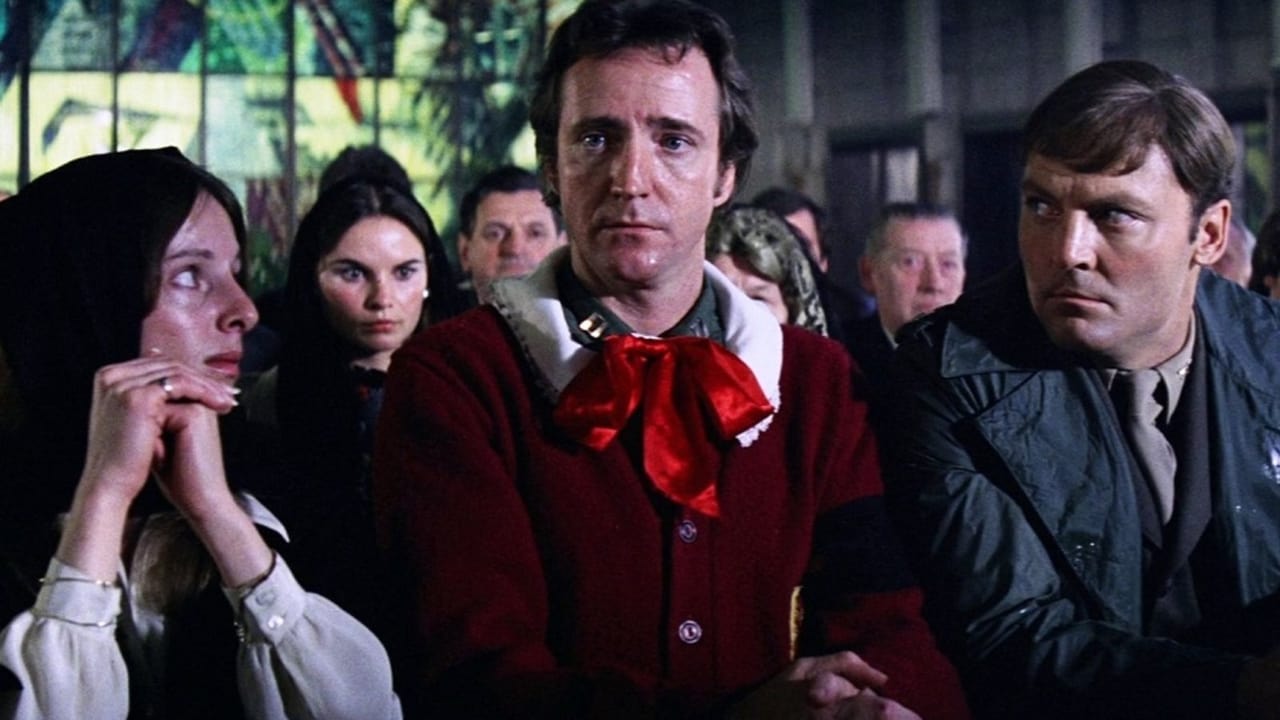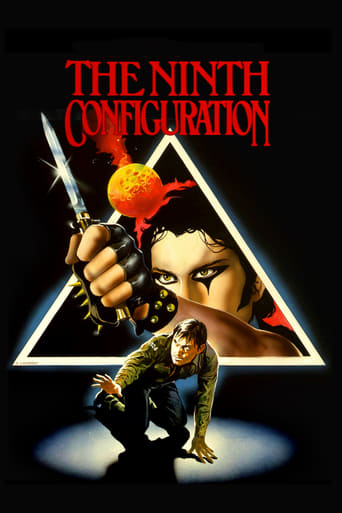

The film is "related" as a genre with the masterpiece "One Flew Over the Cuckoo's Nest"(1975) and is far from being considered a masterpiece itself. William Peter Blatty("The Exorcist"), director and screenwriter, does an excellent job, guiding a number of outstanding actors. In particular Scott Wilson and Stacy Keach, each makes a very special role, I think these are their best roles throughout their whole career. Jason Miller, Ed Flanders, Neville Brand, Moses Gunn, Robert Loggia, Richard Lynch, Steve Sandor, are also very good. I will not write more, because this is a movie to be seen and seen again, the words are superfluous.
... View MoreWriter/Director William Peter Blatty, whose novel THE EXORCIST was made into a groundbreaking horror masterpiece by THE FRENCH CONNECTION Oscar-winner William Friedkin, takes personal, independent pride in his very own picture, THE NINTH CONFIGURATION...Mostly because the critics deemed how insanely original it is since "Robert Loggia sings Al Jolson in blackface" and "Jason Miller rehearses HAMLET using dogs" and "Moses Gunn wears superhero spandex" or "a man dressed as a nun tries exorcising a soda machine" or "an image of the crucifixion on the moon," and on and on the weirdness goes but, in the reality of this surreal anti-war, existentialist vs religion fable: being set inside a castle that serves as an insane asylum, there could have been even more nutty stuff... Anything goes in a story about human beings who are seemingly without logic or limits... And in that, NINTH is actually an extremely grounded vehicle...Upon a wide-shot glance it's an esemble comedy, as if the members of MASH's 4077th practiced witchcraft on benzedrine, but there are really only two characters that actually matter. One is Scott Wilson, playing the same astronaut that Linda Blair warned was "gonna die up there" before she soaked the rug in THE EXORCIST, based on Blatty's famous novel (yet that is never mentioned)...His Captain Billy Cutshaw is the type of 'Crazy like a Fox' character who can spout as much meaningful dialogue as is allowed to counter his rambling residual of meaningless gibberish, and he's nicely balanced by Stacy Keach's silent and seemingly non-troubled Col. Vincent Kane...As the new psychologist inside the castle of war-weary loons, he's there to listen yet is just too perfect, somehow... As Billy puts it, foreshadowing BLADE RUNNER by a few years, "Too human to be human" (and here's a personal favorite line, "the essence of suicide is not collecting the insurance")...There's probably not a more downright quotable motion picture ever made, despite Blatty, the writer, aiming words like sharpened arrows within this Gothic locale that could've used a little more suspense and intrigue to complete its dark, formidable canvas: this includes creature-statues right out of THE EXORCIST's Iraqi tomb-digging prologue... Leaving any kind of mainstream fare to a third-act sequence involving a popular cinematic device during the late 70's/early 80's: Rowdy bikers in a crowded tavern. Although the "bar-fight scene" is more DELIVERANCE-eerie than action-packed, and is part of an important twist that, had they used the source novel's title for this adaptation, would be a spoiler in itself, marring what really connects two polar opposites... the believer and the non-believer... into a labor-of-love cult film that seemed, by the screenplay alone, meant to be that and nothing else: Some movies haven't got a choice. (cultfilmfreaks.com)
... View MoreConsidered by writer, producer, and director William Peter Blatty to be the true sequel to his story "The Exorcist", "The Ninth Configuration" has ended up with a cult-movie type reputation, but actually deserves even better. It's equal parts comic and tragic. It's never less than interesting, which is always a good thing. It's emotionally satisfying and ultimately uplifting, while providing a good deal of food for thought. One could look at it as a cult movie for the "thinking person". It's extremely atmospheric - it gets a lot out of its main setting - and an incredible ensemble brings a rich assortment of oddball characters to life.Stacy Keach plays Colonel Kane (the original title of the story, for those who don't know, was "Twinkle, Twinkle, Killer Kane"), the new head shrink in a castle in the Pacific Northwest that has been converted into an insane asylum by the government. The inmates are military men whose insanity may or may not be genuine. One of the latest arrivals is a former astronaut named Billy Cutshaw (Scott Wilson), who aborted his mission to the moon, afraid of what might be out there. He desperately appeals to Colonel Kane to come up with some sort of proof that God exists, but Kane has his own problems, which is apparent right from the outset.Blatty's dialogue is highly quotable and his theme of "the mystery of good" makes this stimulating from beginning to end. The pace is quite sedate, but some viewers might not mind at all. Although it's largely about story and characters, it *can* boast a very intense and rousing barroom confrontation, where Kane and Cutshaw come face to face with bikers played by the likes of Richard Lynch and Steve Sandor. Filmed on location in Hungary and Germany, it looks especially good in Panavision. Barry De Vorzons' music is good but its use is sparing. The men in this story are a colourful bunch, to boot: one fancies himself a superhero, and another is determined to mount productions of Shakespeare with canine casts. (Of course, he's loathe to cast a Great Dane as Hamlet; that would be too obvious.)The cast is just wonderful. Keach offers a remarkably controlled performance; only once does he lose his cool. Wilson, whom the modern audience will know from 'The Walking Dead', is a delight as the despairing astronaut. Buffs will admire the roster of top character actors in supporting parts: other than Lynch and Sandor, there's Jason Miller, Ed Flanders, Neville Brand, George DiCenzo, Moses Gunn, Robert Loggia, Joe Spinell, Alejandro Rey, Tom Atkins, and William Lucking. Blatty himself appears uncredited as Lt. Fromme.This is one film to see and admire, film lovers. It might not be to all tastes, but it does come highly recommended.Nine out of 10.
... View MoreA new commanding officer arrives at a remote castle serving as an insane asylum for the ill and AWOL U.S. Army soldiers.He attempts to rehabilitate them by allowing them to live out their fantasies while combating his own long-suppressed insanity....Blatty's own sequel to the original Exorcist, this film has to be one of the most bizarre things I have ever seen.Dogs learning Shakespeare, Robert Loggia wearing a space suit, Stacey Keach putting in an amazing performance, it's all here.And you really have to be in the right mood to watch this oddity, or it will probably go right over ones head, and leave you a little bored ultimately.And while it's good, very good in fact, it gets a little confused from time to time, and it becomes as insane as some of the characters.for imagery though, it's sublime, and the film really kicks up a gear when we reach the final act, and the bar scene. If the rest of the film was as good as the final act, it would have been one of the best films I've ever seen, as it really intimidates the viewer, and the final scene really wraps every thing up nicely.everything comes good with sacrifice.
... View More